Abstract
Kazakhstan is one of the first countries among post-soviet countries who started to reform psychological education. But graduates of psychological departments don't see real opportunities for professional selfrealization. It actualizes the problem of quality of professional training among young psychologists and initiate interest of researchers to various aspects of development of their readiness to professional activity. Study the main determinant defining development of readiness for professional activity among future psychologists. As a research methods there were used following questionnaires: "Psychosocial potential of readiness for professional activity of the expert psychologist", "Diagnostics of professional identity of students psychologists", "An orientation on professional self-realization", "Satisfaction with the chosen profession", "Motivation of achievement of professional success", "Technique of research of temperament of the identity of students", "Technique of research of level of a psychological maturity of the personality". The findings of the present study allowed to allocate the components of readiness of future psychologists' professional activity: psychosocial readiness for professional activity, professional identity, orientation, motivation, temperament, and psychological maturity. Thus, psychosocial readiness for professional activity, professional identity, an orientation on professional self-realization, professional motivation, properties of temperament and a psychological maturity are the main determinants of development of readiness for professional activity in future psychologists.
Keywords: Development, Professional activity, Psychological features
1.Introduction
Kazakhstan is the first among countries of Post Soviet Union began reforming the all system of psychological education. According to requirements of Bologna Process the training of the highly skilled psychologists of new generation capable to adapt for new social and economic, political conditions started (Markova, 2010).
It led to update of improvement of quality of vocational training of psychologists and initiated interest of researchers in various aspects of development of their readiness for professional activity.
Thus, taking into account relevance of research, an insufficient readiness, the theoretical and practical importance there was a research definite purpose - studying of the main a determinant, defining development of readiness for professional activity among future psychologists.
2.Problem Statement
Kazakhstan is one of the first countries among post-soviet countries who started to reform psychological education. But graduates of psychological departments don't see real opportunities for professional self-realization (Povarenkov, 2010).
3.Research Questions
Considered issue actualize the problem of quality of professional training among young psychologists and initiate interest of researchers to various aspects of development of their readiness to professional activity. Research consisted of several stages.
The Theoretical-methodological analysis of a problem of readiness for professional activity at future psychologists which is carried out at the first investigation phase allowed us to allocate its main determinants: psychosocial readiness for professional activity, professional identity, motivation, temperament, psychological maturity.
Psychosocial readiness for professional activity in modern psychology and pedagogical literature is treated rather widely: in one researches it is considered as a mental (psychophysiological) state (Teplov, 1963); in other concepts - as psychological property of the personality or set of certain properties, in the third - as installation, as a state but which at the same time is reflection of intrinsic properties of the subject of activity.
According to the analysis of all these points of view, in the present research we consider psychosocial readiness for activity - as the active condition of the personality causing activity; as a result of activity; as the quality defining installations on professional situations and tasks; as the prerequisite to purposeful activity; as form of activity of the subject (Rubenstein, 2010).
As the main indicators of professional identity there were allocated: • Sensibleness (consciousness level, self-acceptance, adequacy of a self-assessment); • Formation (feeling of participation in professional community, approach to a subjective image of the professional, compliance to professional requirements); • Acceptance (the positive emotional relation to a profession and to itself in professions, acceptance of a professional role, coherence level between personal and professional identity).
Considering professional motivation as dynamic hierarchical system of the motives causing internal and external activity of the person in the professional sphere as its main indicators we allocated:
• level of motivation of achievement of professional success (aspiration to achievements in the
sphere of professional activity);
• level of satisfaction with the chosen profession (coherence between the purposes and
opportunities of professional activity and system of personal aspirations, values, meanings);
• level of a motivational orientation on professional self-realization (the importance of
possibility of realization of the potential in the professional sphere).
Based on Pavlov's concept about types of higher nervous activity, as the main properties of temperament having impact on features of manifestation of readiness for professional activity we allocated (Pavlov, 1951): • force (characterizes ability of the person to maintain long and intensive influence of various factors, and also to resist negative influence of environment that is shown in long preservation of high efficiency of activity in difficult conditions, in steadiness, emotional and behavioural stability, ability to self-control);
• activity (characterizes the general level of an energy potential that is shown in intensity and frequency of actions, in the speed and rate of activity, in power of aspirations, desires, installations; in width and to a variety of reactions, in initiative, ability to the fast adaptation at change of a situation (to adaptation), in readiness and aspiration for interaction with new objects and the phenomena).
Considering a psychological maturity as determinant of readiness for professional activity at
future psychologists, we allocated its main structural components:
• a personal maturity (set of the psychological properties characterizing the person as capable to
self-determination, self-acceptance, open for new experience);
• an intellectual maturity (set of the psychological properties characterizing the person as
capable to knowledge, to logical thinking, to a reflection and creativity);
• an emotional maturity (set of the psychological properties characterizing the person as capable
to conscious self-control of emotional manifestations);
• a social maturity (set of the psychological properties characterizing the person as capable to carry out effective interaction with others in the system of interpersonal relationship founded on the humanistic principles).
4.Purpose of the Study
Study the main determinant defining development of readiness for professional activity among
future psychologists.
5.Research Methods
At the second stage of our research for the purpose of empirical studying development of readiness for professional activity in future psychologists, we developed the methodical tools including the following techniques: • "Psychosocial potential of readiness for professional activity of the expert psychologist"; • "Diagnostics of professional identity of students psychologists"; • "An orientation on professional self-realization"; • "Satisfaction with the chosen profession"; • "Motivation of achievement of professional success";
• "Technique of research of temperament of the identity of students"; • "Technique of research of level of a psychological maturity of the personality".
Experimental study was carried out on the basis of psychological office of faculty of philosophy and political science of Al-Farabi Kazakh National University, faculty of psychology of the East Kazakhstan state university of S. Amanzholov, faculty of psychology of Turan University. In total research captured 2857 students, internal and correspondence offices.
At the third research stage the analysis of the received results was carried out. For statistical data processing Fischer's f-criterion, the correlation analysis, t-criterion, the dispersive analysis, etc. was used.
6.Findings
Results of a technique "The psychosocial potential of readiness for professional activity of the expert psychologist" showed that most of future psychologists - 89,4% (Figure 1) have the average level of psychosocial readiness. Among students of a full-time department of such studied 92,2%, a correspondence department – 85,4%; rather more high rates are revealed among students of a correspondence department. Among students 2 courses of 94,5% have the average level of psychological readiness, on the 3rd course of such students of 74,5%, and on the 4th course – 95,1%. Rather more high rates are revealed among students 4 courses.
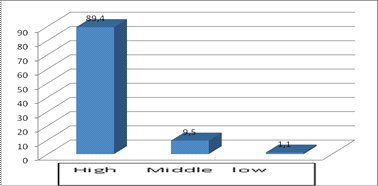
The research of professional identity conducted by means of a technique of research of professional identity of future psychologists was allowed to note that the majority of them have the average level of professional identity - 55,7% (Figure 2).
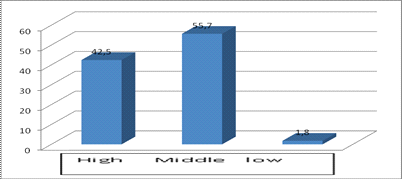
among indicators of professional identity of the highest level at our investigated reaches "acceptance", and among components cognitive and konativny components are the most expressed.

The differentiated analysis of a level of developed indicators of professional identity by means of tables of an associativity showed that sensibleness is more expressed at students of 3 courses of a correspondence department, and least expressed – students have 3 courses of a full-time department; the formation is more expressed at students 4 courses of a correspondence department, and least expressed at students 2 courses of a correspondence department; acceptance is more expressed at students 4 courses of a correspondence department, and 2 courses of a correspondence department are least expressed at students; the motivational component of professional identity is more developed at students 4 courses of a correspondence department, and least developed at students 2 courses of a correspondence department; the cognitive component of professional identity is more developed at students 4 courses of a correspondence department, and less developed at students 3 courses of a correspondence department; the konativny component of professional identity is more developed at students 4 courses of a correspondence department, and less developed at students 2 courses of a correspondence department; the affective component of professional identity is more developed at students 3 courses of a full-time department, and less developed at students 2 courses of a correspondence department;
In general, students of 2 courses differ in rather large number of high rates of development of an
affective component (36,1%), students of 3 courses – a large number of high rates of acceptance
(88,6%) and a conative component of professional identity (88,6%), and students of 4 courses – rather large number of high rates of understanding (58,1%), formation (66,1%), motivational (50,1%), a cognitive component of professional identity (74,2%). Students of a correspondence department have higher values of all indicators, in comparison with students of a full-time department.
The analysis which is carried out on t-criterion allowed to reveal significant differences between groups of students of day and correspondence offices almost on all indicators except a cognitive component of professional identity (sensibleness – 3,28 (at r<0,01), formation – 3,288 (at r<0,01), acceptances – 7,001 (at r<0,01), a motivational component – 3,393 (at r<0,01), a konativny component – 5,469 (at r<0,01), an affective component – 6,365 (at r<0,01), and also between groups of students 4 courses to acceptance indicators (4,265 at r<0,01) and to development of a cognitive component of professional identity (4,151 at r<0,01).
Conducted techniques "An orientation on professional self-realization", "Satisfaction with the chosen profession" and "Motivation of achievement of professional success" allowed to determine the general level of professional motivation (motivation) future psychologists (Figure 3).
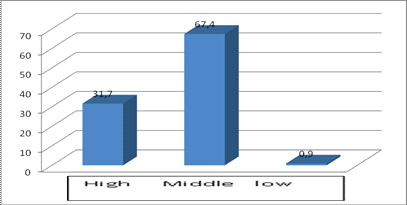

psychological faculties. In general, it is possible to note that students of 4 courses are ahead of others on all indicators. Students of a correspondence department also surpass students of a fulltime department in all indicators of professional motivation.
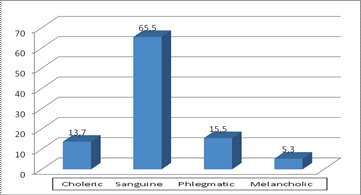
The differentiated analysis showed that students of different forms of education almost don't differ on ratios of types of temperament. Among students of different courses approximately same picture is observed, but it is slightly more than representatives of choleric temperament on the 2nd course, melancholic – on the 3rd, and phlegmatic – on the 4th course.
The differentiated analysis of a level of development of indicators of properties of temperament by means of tables of an associability which is carried out among students of different courses and forms of education gave the chance to define that indicators of such property as force (And), is highest at students 2 courses of a correspondence department, and this property at students 3 courses of a full-time department was least expressed; activity (In) is also highest at students 2 courses of a correspondence department, and this property is least expressed - students have 3 courses of a correspondence department.
The analysis of results of the carried-out technique of research of level of a psychological maturity of the personality showed that most of future psychologists have the average level of a psychological maturity - 58,5% (Figure 5).
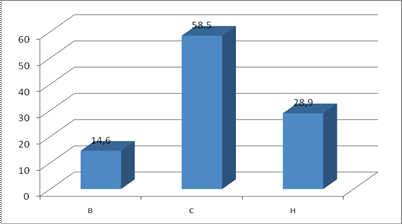
The differentiated analysis of a level of development of indicators of a psychological maturity by means of tables of an associability which is carried out among students of different courses and forms of education showed that the personal maturity is more developed at students 3 courses of a correspondence department, and least developed – students have 2 courses of a correspondence department; the intellectual maturity is also more developed among students 3 courses of a correspondence department, and least developed – students have 3 courses of a full-time department; the emotional maturity is more developed at students of 2 and 4 courses of a full-time department, and least developed – students have 3 courses of a full-time department; the social maturity is more developed among students 3 courses of a correspondence department, and least developed at students 4 courses of a correspondence department; ability to self-acceptance is more developed among students 3 courses of a correspondence department, and least developed at students 4 courses of a correspondence department; ability to self-development is more developed at students of 2 and 3 courses of a correspondence department, and least developed – students have 3 courses of a full-time department; ability to self-realization is more developed at students 3 courses of a correspondence department, and least developed – students have 3 courses of a fulltime department.
Thus, the carried-out analysis allowed to note that professional identity, professional motivation,
properties of temperament and a psychological maturity are the main determinants of development of readiness for professional activity of future psychologists. However, their influence has specific features in dependence both on a course or form of education, and on connection of the allocated factors among themselves that gives the grounds to approve about existence of system psychological a determinant.
7.Conclusions
As a conclusion psychosocial readiness for professional activity, professional identity, an orientation on professional self-realization, professional motivation, properties of temperament and a psychological maturity are the main determinants of development of readiness for professional activity in future psychologists.
References
Markova, A.K. (2010). Psychology of professionalism. M: Aspect Press.
Pavlov, I.P. (1951). Complete works / Nominative Pavlov. M: T.Sh.
Povarenkov, Yu.P. (2010). Psychological content of professional formation of the person. M: Sense Rubenstein, S. L. (2010). Fundamentals of the general psychology. SPb.: St. Petersburg.
Teplov, B.M. (1963). New data on studying of properties of nervous system of the person. Typological features of higher nervous activity of the person/ under the editorship of B. M. Teplov, 3, 22-26.
171
Copyright information

This work is licensed under a Creative Commons Attribution-NonCommercial-NoDerivatives 4.0 International License.
About this article
Publication Date
06 January 2015
Article Doi
eBook ISBN
978-1-80296-001-3
Publisher
Future Academy
Volume
2
Print ISBN (optional)
-
Edition Number
1st Edition
Pages
1-218
Subjects
Educational psychology, education, psychology, social psychology, group psychology, collective psychology
Cite this article as:
Aimaganbetova, O., Aimaganbetov, A., Naurzalina, D., Karabalina, A., Tolegenova, A., & Ganieva, Z. (2015). Development of professional activity among future psychologists. In Z. Bekirogullari, & M. Y. Minas (Eds.), Cognitive - Social, and Behavioural Sciences – icCSBs 2015 January, vol 2. European Proceedings of Social and Behavioural Sciences (pp. 163-171). Future Academy. https://doi.org/10.15405/epsbs.2015.01.19

